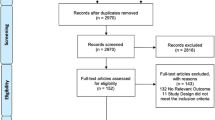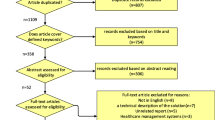Abstract
Background
Despite the fact that the Chinese belong to the largest visible minority group in Canada, there is little research findings on their health status, particularly the aging adults. This research aimed at bridging the knowledge gap by examining the health status of this population and comparing the health status between the Chinese aging population and the general aging population in Canada.
Methods
Secondary data analysis of data obtained from a multi-site study, Health and Well Being of Older Chinese in Canada, and from the Medical Outcomes Study 36-item Short Form (SF-36). The SF-36 published scores obtained from the same age cohorts in the Canadian Multicentre Osteoporosis Study were used for comparison purposes. Independent samples t-tests were used to compare the statistical significance of the two groups.
Results
Overall, older Chinese-Canadians reported better physical health than all older adults in the Canadian population. However, the older Chinese in all age and gender groups scored lower in the mental component summary (MCS). Despite the age differences, Chinese women reported statistically poorer health than the Chinese men in all of the 8 health domains.
Conclusion
The data are useful for forming baselines for monitoring the effectiveness of future health interventions for this population. Efforts by service providers to address the health needs of older Chinese-Canadian women, the most vulnerable subgroup in this study, are essential. Interventions are also needed to address the poor mental health status in this ethnic minority group.
RéSumé
Contexte
Bien que les Chinois représentent la plus importante minorité visible au Canada, il existe très peu de données sur leur état de santé, surtout celui des adultes vieillissants. Pour combler cette lacune, nous avons examiné l’état de santé de la population sino-canadienne et comparé l’état de santé de ses membres vieillissants à celui de l’ensemble de la population vieillissante au Canada.
Méthode
Analyse des données secondaires d’une étude multisite (Health and Well Being of Older Chinese in Canada) et de la version abrégée du questionnaire sur l’état de santé en 36 éléments pour les études des résultats cliniques (SF-36). Pour fins de comparaison, nous avons utilisé les scores publiés du questionnaire SF-36 pour les cohortes du même âge de l’Étude canadienne multicentrique sur l’ostéoporose. Des tests t sur un échantillon indépendant ont ensuite servi à comparer la signification statistique dans les deux groupes.
Résultats
Globalement, les Sino-Canadiens âgés se disent en meilleure santé physique que les personnes âgées dans l’ensemble de la population canadienne. Cependant, les Chinois âgés, dans tous les groupes d’âge, hommes et femmes, ont obtenu des scores plus faibles à la composante santé mentale du SF-36. Malgré les différences d’âge, les Chinoises étaient statistiquement en moins bonne santé que les Chinois dans les huit domaines de santé évalués.
Conclusion
Ces résultats seront utiles comme données de base pour surveiller l’efficacité des futures interventions sanitaires auprès de la population sino-canadienne âgée. Il est essentiel que les prestateurs de services fassent des efforts pour répondre aux besoins de santé des Chinoises âgées, qui composent le sous-groupe le plus vulnérable de l’étude. Des mesures d’intervention sont également nécessaires en réponse au piètre état de santé mentale dans cette minorité ethnique.
Similar content being viewed by others
References
Statistics Canada. Canada’s ethnocultural portrait: The changing mosaic: Ottawa, ON: Statistics Canada. Available at: https://doi.org/www12.statcan.ca/english/census01/products/ highlight/Ethnicity/Index.cfm Accessed February 10, 2003.
Statistics Canada. Nation Series Package, No. 6: Ethnic Origin and Visible Minority Population (data products: The Nation: 1996 Census of Population) [CD-ROM]. Ottawa, ON: Statistics Canada, 1998.
Statistics Canada. Profile of the Canadian population by age and sex: Canada ages. Catalogue, no. 96F0030XIE2001002. Ottawa, ON: Statistics Canada, 2002.
Lai DWL. Measuring depression in Canada’s elderly Chinese population: Use of a community screening instrument. Can J Psychiatry 2000;45(3):279–84.
Lai DWL. Prevalence of depression among the elderly Chinese in Canada. Can J Public Health 2000;91(1):64–66.
Lai DWL, MacDonald, JR. Life satisfaction of Chinese elderly immigrants in Calgary. Can J Aging 1995;14(3):536–52.
Gee, EM. Living arrangements and quality of life among Chinese Canadian elders. Soc Indicators Res 2000;51(3):309–29.
Cheng AY, Tsui EY, Hanley AJ, Zinman B. Developing a quality of life measure for Chinese patients with diabetes. Diabetes Res Clin Pract 1999;46(3):259–67.
Whittemore, AS. Colorectal cancer incidence among Chinese in North America and the People’s Republic of China: Variation with sex, age and anatomical site. Int J Epidemiol 1989;18(3):563–68.
Bagley, CR. Mental health and social adjustment of elderly Chinese immigrants in Canada. Canada’s Mental Health 1993;41(3):6–10.
Wong PT, Reker, GT. Stress, coping, and wellbeing in Anglo and Chinese elderly. Can J Aging 1985;4(1):29–37.
Bagley, CR. Social psychological adjustments of migrant and non migrant elderly in Canada and Hong Kong. Asia Pacific J Social Work 1993;3:67–76.
Chan, KB. Coping with aging and managing selfidentity: The social world of the elderly Chinese women. Can Ethnic Studies 1983;15:36–50.
Chappell NL, Lai D. Health care services use by Chinese seniors in British Columbia, Canada. J Cross-Cultural Gerontol 1998;13:21–37.
Lai DWL, Tsang KT, Chappell NL, Lai DCY, Chau SBY. Health and well being of older Chinese in Canada. Calgary, AB: University of Calgary, 2003.
Hopman WM, Towheed T, Anastassiades T, Tenenhouse A, Poliquin S, Berger C, et al. Canadian normative data for the SF-36 health survey. CMAJ 2000;163(3):265–71.
Himmelfarb HS, Loar RM, Mott, SH. Sampling by ethnic surnames: The case of American Jews. Public Opinion Q 1983;47:247–60.
Choi BCK, Hanley AJG, Holowaty EJ, Dale D. Use of surnames to identify individuals of Chinese ancestry. Am J Epidemiol 1993;138(9):723–34.
Abrahamse AF, Morrison PA, Bolton, NM. Surname analysis for estimating local concentration of Hispanics and Asians. Population Res Policy Rev 1994;13:383–98.
Rosenwaike I. Surname analysis as a means of estimating minority elderly: An application using Asian surnames. Research on Aging 1994;16(2):212–27.
Lauderdale DS, Kestenbaum B. Asian American ethnic identification by surname. Population Res Policy Rev 2000;19:283–300.
Tjam, EY. How to find Chinese research participants: Use of a phonologically based surname search method. Can J Public Health 2001;92(2):138–42.
Ware JE Jr, Kosinski M, Keller, SD. SF-36 Physical & Mental Health Summary Scales: A User’s Manual. Boston, MA: The Health Institute, New England Medical Centre, 1993.
Ren XS, Chang K. Evaluating health status of elderly Chinese in Boston. J Clin Epidemiol 1998;51:429–35.
Ren XS, Amick B, Zhou L, Gandek B. Translation and psychometric evaluation of a Chinese version of the SF-36 Health Survey in the United States. J Clin Epidemiol 1998;51:1129–38.
Hyman I. Immigration and health. Health Policy Working Paper Series. Working Paper 01-05. Ottawa, ON: Health Canada, 2001. Available on-line at: https://doi.org/www.hc-sc.gc.ca/iacbdgiac/ nhrdp/index.html.
Gelfand D, Yee BWK. Influence of immigration, migration, and acculturation on the fabric of aging in America. Generations 1991;15:7–10.
Yu ESH. Health of the Chinese elderly in America. Research on Aging 1986;8:84–109.
Berry JW, Kim V, Minde T. Comparative studies of acculturative stress. Int Migration Rev 1987;21:491–511.
Casado BL, Leung P. Migratory grief and depression among elderly Chinese American immigrants. J Gerontological Social Work 2001;36:5–26.
Lin, TY. Psychiatry and Chinese culture. West J Med 1983;129:862.
Author information
Authors and Affiliations
Corresponding author
Additional information
This research was funded by the Social Sciences and Humanities Research Council under the Strategic Theme: Society, Culture and Health of Canadians (Grant No: 828-1999-1032). Principal Investigator: Dr. Daniel Lai, University of Calgary Co-investigators: Dr. Ka Tat Tsang, University of Toronto; Dr. Neena Chappell, University of Victoria; Dr. David Lai, University of Victoria; Shirley Chau, University of Toronto.
Rights and permissions
About this article
Cite this article
Lai, D.W.L. Health Status of Older Chinese in Canada. Can J Public Health 95, 193–197 (2004). https://doi.org/10.1007/BF03403647
Received:
Accepted:
Published:
Issue Date:
DOI: https://doi.org/10.1007/BF03403647




